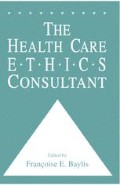Abstract
When the Network on Health Care Ethics Consultation began developing “A Profile of the Health Care Ethics Consultant,” it quickly became apparent that information was needed about who was actually doing ethics consultation, what kind of training and skills they possessed, what ethics activities they engaged in, and what their views were on certification. Such knowledge would serve as a “reality check” on the deliberations of the Network and would help focus the discussions.
Access this chapter
Tax calculation will be finalised at checkout
Purchases are for personal use only
Preview
Unable to display preview. Download preview PDF.
Notes and References
A number of studies have examined the qualities and training of ethics consultants, but not from an empirical perspective. See, for example, Terrence F. Ackerman, “The Role of an Ethicist in Health Care,” Health Care Ethics: A Guide for Decision-Makers, eds. Gary R. Anderson and Valerie A. Glesnes-Anderson ( Rockville, MD: Aspen, 1987 ) 308–320;
Françoise Baylis, “Moral Experts and Moral Expertise: Wherein Lies the Difference?” Clinical Ethics: Theory and Practice, eds. Barry Hoffmaster, Benjamin Freedman, and Gwen Fraser ( Clifton, NJ: Humana, 1989 ) 89–99;
Peter A. Singer, Edmund D. Pellegrino, and Mark Siegler, “Ethics Committees and Consultants,” Journal of Clinical Ethics 1 (1990): 263–267;
John La Puma and David L. Schiedermayer, “Ethics Consultation: Skills, Roles, and Training,” Annals of Internal Medicine 114. 2 (1991): 155–160;
David C. Thomasma, “Why Philosophers Should Offer Ethics Consultations,” Theoretical Medicine 12 (1991): 129–140;
John La Puma and E. Rush Priest, “Medical Staff Privileges for Ethics Consultants: An Institutional Model,” Quality Review Bulletin 18. 1 (1992): 17–20.
Society for Bioethics Consultation, 6th Annual Meeting, Chicago, Sep. 1992.
Joyce Bermel, “Ethics Consultants: A Self-Portrait of Decision Makers,” Hastings Center Report 15. 6 (1985): 2.
Donnie J. Self and Joy D. Skeel, “Professional Liability (Malpractice) Coverage of Humanist Scholars Functioning as Clinical Medical Ethicists,” Journal of Medical Humanities and Bioethics 9 (1988): 101–110.
After we submitted this chapter, a further report of the Self and Skeel study appeared: Joy D. Skeel, Donnie J. Self, and Roland T. Skeel: Joy D. Skeel, Donnie J. Self, and Roland T. Skeel, “A Description of Humanist Scholars Functioning as Ethicists in the Clinical Setting,” Cambridge Quarterly of Health Care Ethics 2 (1993): 485–494.
Michael D. Coughlin and John L. Watts, “A Descriptive Study of the Health Care Ethics Consultant in Canada,” HEC Forum 5 (1993): 144–164. The authors express their appreciation to the publisher of HEC Forum for permission to use material from that chapter in this chapter.
Coughlin and Watts. The slight discrepancies in the data presented here and in the preliminary analysis are due to more careful screening for duplicate responses and to a different method for assigning “primary discipline” (i.e.,“feeder” discipline) to the respondents.
Peter Allatt, “The Ethics Committee Network of South Central Ontario (Canada),” HEC Forum 3 (1993): 212–216.
Kindly provided by Professor Marie-Hélène Parizeau, coordinator of the GREM (Groupe de Recherche en Éthique Médicale). The study is published as Les Comités d’Éthique au Québec: Guide des Resources en Centres Hospitaliers ( Montréal: Government of Québec, 1991 ).
In the study by Self and Skeel, 15% of those providing ethics consultation were women.
La Puma and Schiedermayer.
It is important to note that until extremely recently, Canadian universities did not give doctorates in nursing.
For a similar discussion, see Berme’.
Editor information
Editors and Affiliations
Rights and permissions
Copyright information
© 1994 Springer Science+Business Media New York
About this chapter
Cite this chapter
Coughlin, M.D., Watts, J.L. (1994). What Does a Health Care Ethics Consultant Look Like?. In: Baylis, F.E. (eds) The Health Care Ethics Consultant. Contemporary Issues in Biomedicine, Ethics, and Society. Humana Press, Totowa, NJ. https://doi.org/10.1007/978-1-4757-2305-2_8
Download citation
DOI: https://doi.org/10.1007/978-1-4757-2305-2_8
Publisher Name: Humana Press, Totowa, NJ
Print ISBN: 978-1-61737-003-8
Online ISBN: 978-1-4757-2305-2
eBook Packages: Springer Book Archive

